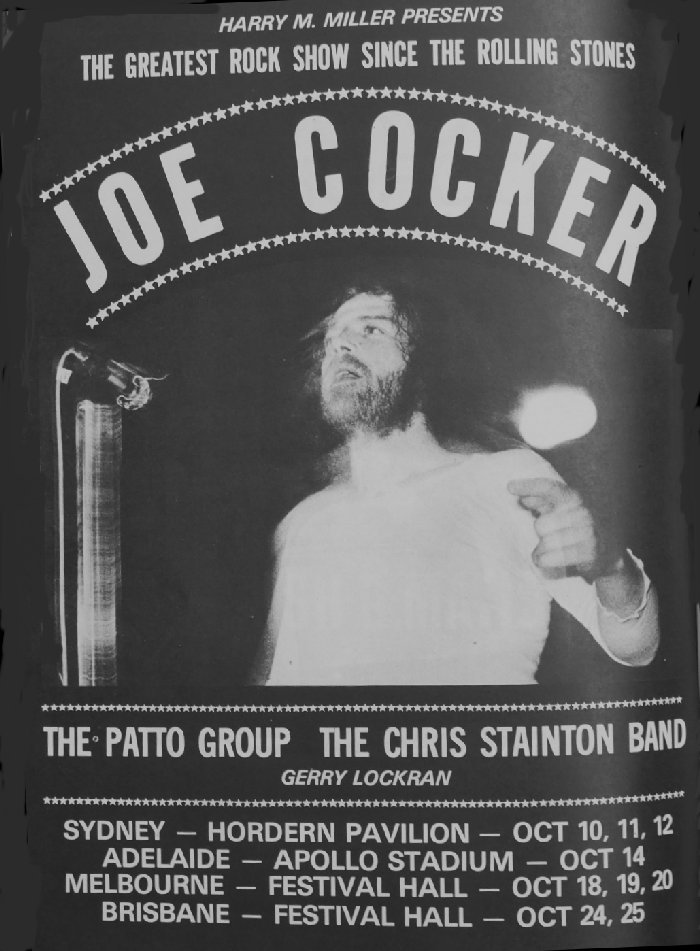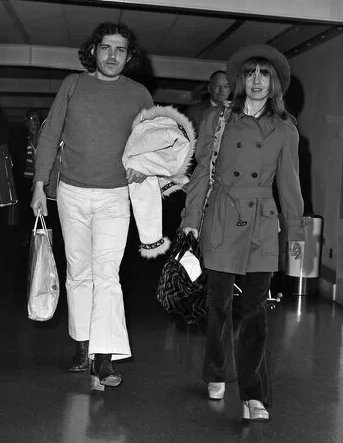
HISTORY | STORIES | BEYOND BLOG & CREATE PEOPLE |
A Big Wild Party
Touring with rock singer Joe Cocker was described as a "a big, wild party". But Joe Cocker's Australian 1972 tour took an ill-fated turn when authorities decided it was too big a party,
and promptly deported him and his band.
In the rest of the world, Cocker's popularity was riding high on the success of his bluesy/rock style and his various appearances at festivals in America, notably, Woodstock and Newport. Popular or not, the Australian government thought he was corrupting Australia's youth, and wanted him gone!
Joe Cocker
John Robert "Joe" Cocker OBE (20 May 1944 – 22 December 2014) was an English rock singer known for his gritty voice, spasmodic body
movement in performance, and distinctive versions of popular songs of varying genres.
He performed cover versions of songs by other well-known musicians, the most famous being The Beatles'
"With a Little Help From My Friends" which reached number one in the UK charts in 1968. But he beefed the songs up, gave them some extra zing to turn pieces of music
into entertaining stage performances. With wild tizzed hair, barefoot and loose clothing, he flailed his arms about, and
broke into dramatic air-guitar pieces. His voice filled a space. Was he drunk? Was he mad? Was he stoned? No, it was his theatre, his stage
performance. Guardians of public morals, however, sometimes could not distinguish between the man and the performer.

Australian Tour
In October 1972 Joe Cocker and his band began their tour of Australia in Sydney. The band reportedly brought 15 tonnes of equipment, with the performance
running for three-and-a-half hours. Write-ups of the opening three nights in Sydney were ecstatic. One press headline read:
“Cocker Fever Hits Sydney - Best Rock Show Ever to Hit Australia". Even his own publicity called him "The Greatest Rock Show Since the Rolling Stones".
Out of Touch Government
By the time Joe hit Australia in 1972 though, the conservative Liberal-Country Coalition federal government had been in power since 1949 and was increasingly being seen by the electorate
as old-fashioned and out-of-date. Rather than try and update their policies and image, they
instead attempted to disparage contemporary fashions and trends to bolster their ratings. Rock musicians and
entertainers were obvious targets to being portrayed as perverters of youth and community values.
The American comedian Dick Greogry (1932 - 1917), for instance, was denied a visa to perform in Australia (on the University campus circuit) in September 1970, as the then Minister of Immigration Phillip Lynch explained, he also planned to speak at an anti-Vietnam Moritorium event, "presenting a one-sided polictical view".
Richard Cole, who managed the rock band Led Zeppelin recounted in his biography of the band, how early on its 1972 Australian tour, police eager to make a name for themselves as crime busters, raided the band's Perth hotel looking for drugs. This was, he said, a lucky break, because though no drugs were found, he doubted whether the no-drugs situation would last, so he hired security guards to ensure police did not barge in again, without a search warrant.
Busted in Adelaide
After sell-out performances in Sydney that wowed audiences, Cocker and his band moved onto Adelaide where they gave another outstanding performance at the Apollo
Stadium. That's when the real trouble began.
According to Adelaide's The Advertiser Joe and his band were unlucky enough to be staying in the same hotel, The Park Royal, as Sir Alan Carmody, the Secretary of the federal department of Customs and Excise, a real "V.I.P." Carmody had an early plane to catch to Canberra and rang reception to complain about the party noise and the pungent aromas coming from adjoining rooms housing Cocker's party.
The police jumped to attention from this phone complaint and within 15 minutes, the drug squad arrived and Cocker and six members of his band were taken to police headquarters where they were charged. In his book Let the Goodtimes Roll, bodyguard Bob Jones, said that the police only found enough stuff to roll a couple of joints, hardly the makings to cause seven people to engage in a drug addled debauche.
Other retellings of those events in Adelaide that night have it that Joe, who was out of it at the best of times, was none-the-less a very amiable personality. When the drug squad asked if they had any drugs, the every personable Cocker replied "Yeah, sure. There must be some around here", which the police took as an invitation to search the rooms.
Conservative politicians and the press had a field day. At last, proof of the evil influence these rock musicians were having on young Australian minds. The guardians of public morals were fulminating on the need to deport him.
The band members paid their $300 fine, and thought that would be the end of the matter. However, the then Minister for Immigration (Dr Forbes) signed deportation papers giving the seven members 48 hours to leave Australia. Dr Forbes said, censoriously : "I have done this because this Government takes a very serious view of such offences - especially when committed by people who are in a position to have profound influence on many young Australians."
While in Adelaide, Joe was much taken by that unique Adelaide culinary delight, the pie-floater, a meat pie served in a bowl of pea soup. It became one of his favourite dishes but never able to find it anywhere other than in Adelaide. Joe often returned to perform in Adelaide, it was said, so that he could again savour the pie-floater. Thus Adelaide was both the locus of the nadir of his musical career and the apex of his gourmet experience!
The Pie Floater
A favoured Joe Cocker dish
The Melbourne Encounter
Time was running out for Joe and the band. They flew to Melbourne for their scheduled gig in front of 7,000 fans at festival hall on October 19, 1972. It turned out to be a masterful performance, with
rapturous fans holding Cocker with sustained applause to multiple encores. Maybe the triumphant success of what was likely to be his final Australian concert, or maybe Cocker's
public criticism of the events surrounding the deportation order, was too much like rubbing the noses of authorities in the mire ("They can touch our bodies, but they
cannot touch our souls"). The press and authorities seemed to pull out all stops.
One newspaper photograph showed what looked like an unkempt Cocker in a loose white shirt and bare feet being led across an open field. The implication was that an under-the-weather Cocker was being led away by police, when in fact, he was dressed in his stage attire and being helped by a roadie.

Cocker and his girlfriend Eileen Webster were supposed to have become involved in a loud argument, some reports said a "fight", in the lobby of their hotel, the Commodore Chateau. Some implied that he was assaulting his girlfriend, others that he became involved in scuffle with security guards and police. The hotel wanted them out, and maybe they were just complaining about an unfair eviction? Whatever, Cocker and his girlfriend were "arrested" and hauled off to a police station - this time there was no mistaking what was happening to the bare chested Cocker - the coppers were hauling off to the lock-up. But of course, the reason Cocker was bare chested, was because that is the way he had finished his stage act!
The writing was on the wall and Cocker and his promoters arranged for the band to fly out of Australia from Melbourne the next morning. It seemed pointless fighting the deportation threat. Further scheduled concerts in Melbourne, Brisbane and Perth were cancelled. Cocker acquired the nickname of "Mad Dog" after the 197o Mad Dogs and Englishmen tour. The Australian press picked up on it, it seemed to be fitting for the circumstances and was meant to be derisive, too naive to realise it was really carried with pride.
Held No Grudges
The Who visit to Australia was so poorly received by a cantankerous popular press, and barely disguised insults from conservative politicians, that members of the band
said they would never return again. And they didn't. Joe Cocker, however, held no such grudges and despite all the furore in 1972, returned 11 more times to tour Australia, at one
time performing at the Coogee Bay Hotel's Selinas nightclub (I think!). When he next returned in 1975, there was a different government and Australia had changed and there was far less animosity towards him -
though customs officials spent one and half hours searching his luggage at Sydney airport!
When the federal government of John Howard (the political heir of the McMahon government of 1972) wanted to build support for the introduction of their controversial Goods and Services Tax (GST) in 2000, Cocker's version of Unchain My Heart was used to garner support for the new tax policy. For this, Cocker got paid $169,000. Redemption indeed!
Replacing the Old Order
Perhaps the best description of the 1972 affair was by sociologist Craig McGregor who opinioned that it was the "last idiot gasp of the old order in a parochial, midget-minded Australia".
Within six weeks on December 2 1972, the McMahon government was swept from power at the polls, and replaced by the more open minded Whitlam Labor government. One of the characteristics
of the Labor campaign of that year was their use of what was then termed "American style election campaigning" which included all the marketing hoopla associated with US politics. Channeling the
zeitgeist of the time, this included a nine-verse campaign song "It's Time" with a pop/rock feel credited with part of the success of the campaign. Not quite the rock/blues energy of Joe Cocker, but
getting there. It would be hard to imagine the McMahon government, given their treatment of rock musicians, attempting to embrace 1970s popular culture with such a song.
... it was the "last idiot gasp of the old order in a parochial, midget-minded Australia ... "
Later Life
Despite struggles over the years to kick various addictions, Cocker went on to have critical acclaim as one of the world's best known musicians.
Cocker and Eileen Webster had an on and off relationship until they finally separated in 1976. In 1978, he met his wife Pam Baker in Crawford, Colorado, where they lived on a property called "Mad Dog Ranch".
He died from lung cancer on 22 December 2014 in Crawford, Colorado, aged 70. He had smoked 40 cigarettes a day until he quit in 1991. Cocker is buried in Crawford, Colorado.
References
Copyright © Coogee Media All rights reserved